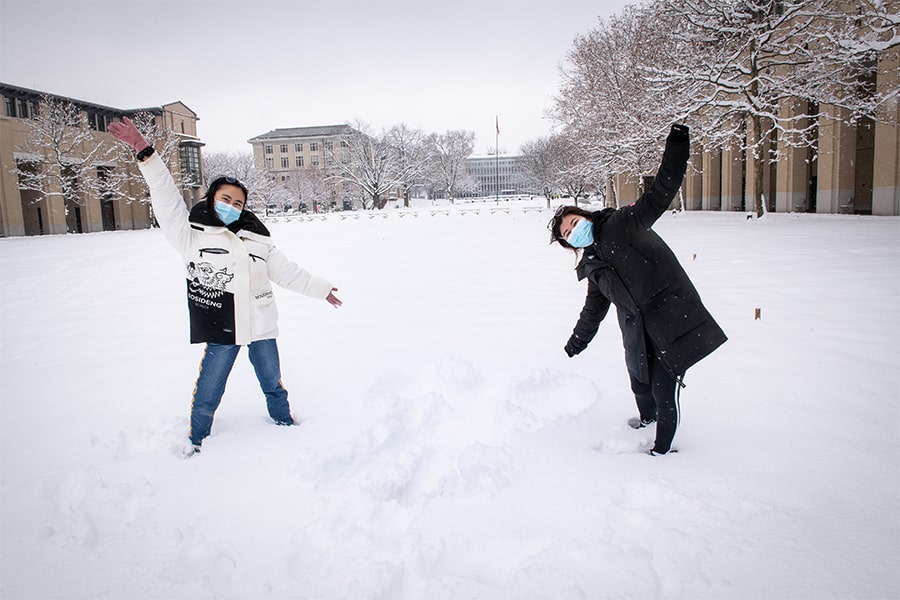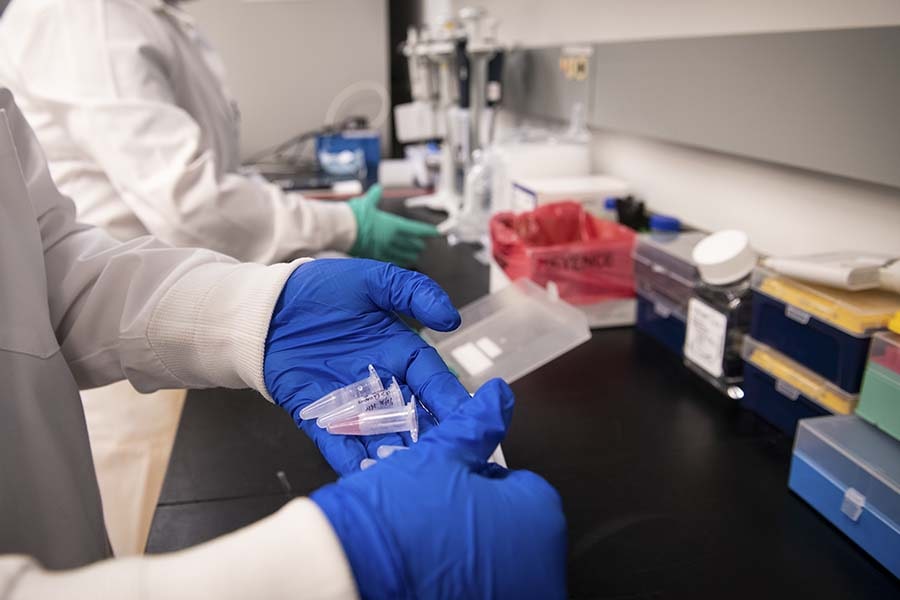Strategies for a Successful Spring Semester
CMU's chief medical officer looks to the future, and past, to inform ways to mitigate COVID-19 on campus
The onset of the COVID-19 pandemic presented the challenge of a generation. Every sector — industry, agriculture, government and education — engaged in how to safely continue operating to keep society from screeching to a halt. At Carnegie Mellon University, leadership, faculty, staff and students all contributed to carrying on the university's mission of providing a transformative educational experience, while enabling innovative researchers to broaden their impact. And all the while, Dr. Christine Andrews, the chief medical officer at CMU, performed on the front line, aiding CMU's efforts to curb the spread of the virus.
Andrews supervises the clinical services provided by University Health Services to Carnegie Mellon's student body. After the first full hybrid fall semester, Andrews said she wants to express something to the CMU community: gratitude.
"Our community did a great job following our COVID-19 mitigation strategies this fall," Andrews said. "I really have to credit our student body, faculty and staff. It's because of them we did as well as we did."
The university was prepared to handle various scenarios, and to date CMU has confirmed 80 total COVID-19 cases present on the main Pittsburgh campus since March of last year. For context, The New York Times tracked coronavirus cases at 1,900 American institutions of higher education, and they report that 680 colleges had over 100 cases and 85 colleges had over 1,000 cases. Andrews attributes CMU's number to the strict adherence to mitigation protocols and behaviors and a strong contact tracing operation.
"When you look around the country at schools experiencing outbreaks, there are some common trends. Students should avoid gathering for parties — situations where there is alcohol involved, no social distancing and no masks," Andrews said. "Small gatherings for meals with housemates or close friends are problematic, too. One of the riskiest things you can do is talk with someone nearby while bringing food into your mouth."
The university's core recommendations haven't changed. Wear a facial covering in public. Practice physical distancing (stay at least 6 feet apart from others). Avoid touching the face. Wash hands frequently with soap and water. Every student traveling to the Pittsburgh region from outside of southwest Pennsylvania must quarantine for 14 days, and they will be tested for COVID-19 after spending at least four days in quarantine.
This semester, CMU is expanding its asymptomatic testing strategy. The university announced the Tartan COVID-19 Asymptomatic Testing Program, or Tartan Testing for short. Throughout the spring semester, all asymptomatic faculty, staff and students planning to be on campus are expected to complete one COVID-19 test weekly through Tartan Testing. Those coming to campus occasionally are expected to test during the week they expect to be on campus. Those not planning to come to campus are not expected to participate, though they will still have the opportunity to obtain an asymptomatic test. These tests will be free of charge to invited participants. Students experiencing COVID-19 symptoms should contact University Health Services and arrange symptomatic testing. Faculty or staff who are in need of symptomatic testing should contact their health care provider.
CMU Tartan Testing lab personnel will process and analyze the tests each week with assistance from robotic systems, turning around test results in approximately two to three business days.
"Last semester we relied on commercial labs and they did a great job for us. The problem came when there was a surge, creating a turnaround time that wasn't helpful," Andrews said. "CMU is a university without a medical school, and we were charged with developing a testing lab from scratch. When we were tasked with creating this lab, there was no question of whether or not it could be done. Partners across campus just dug in and got to work. That's just the way things are done at Carnegie Mellon."
The new testing program's quick results will aid in faster isolation of those who test positive, and give CMU's in-house contact tracers a quicker start to alerting potential close-contacts, helping to reduce the spread of COVID-19.
CMU's mitigation and testing strategies have aimed to reduce the spread of the virus, and now vaccines are starting to be distributed in a phased approach throughout the nation. While distribution plans haven't been finalized for CMU, Andrews emphasizes the importance of getting vaccinated for the health of the individual and the community once it's available.
"As more vaccines become available, it's so important for everyone to be a good citizen and get vaccinated. We are all in this together." — Dr. Christine Andrews
As healthcare workers, Andrews and her staff have all been offered the vaccine.
"Hope. Being vaccinated gave me hope," Andrews said. "We're on the path now to true prevention. My body is going to be able to fight the infection. That made me so hopeful."
Vaccines won't end the worldwide COVID-19 situation overnight. Those vaccinated will still need to get tested, wear facial coverings, maintain social distancing and use other mitigation practices until studies show that vaccination keeps a person from infecting others, or society achieves herd immunity through vaccination.
"As more vaccines become available, it's so important for everyone to be a good citizen and get vaccinated," Andrews said. "We are all in this together."


